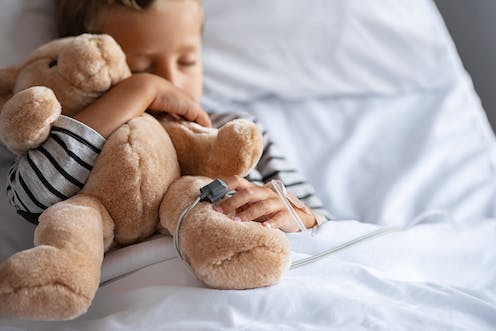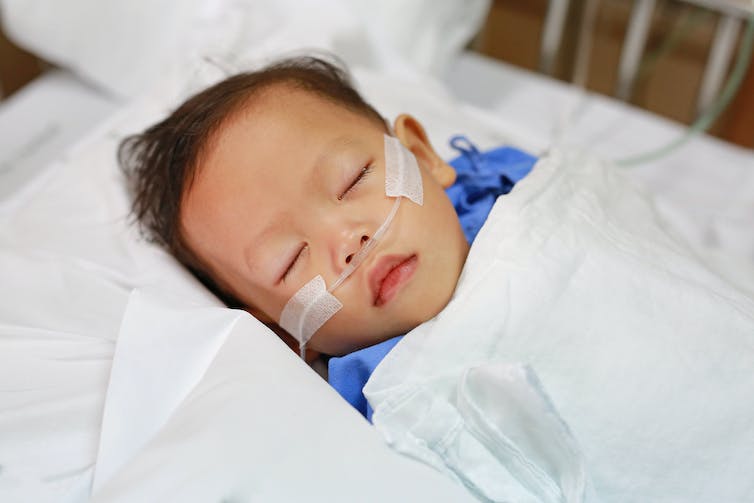
Rido/Shutterstock
At the heights of the pandemic, particularly since 2021, many children and teenagers admitted to hospital had COVID. However, it was never clear what proportion of them were in hospital because of COVID, indicating quite severe illness, or for a different reason (such as an injury), but just happened to test positive for COVID during their admission.
The true degree of severe illness caused by COVID among those under 18 was endlessly argued over by doctors and scientists. It’s been known since early on that severe illness in children was rare and more likely in those children with serious health problems such as a chronic heart condition or a suppressed immune system. But we didn’t know how much age, poverty or ethnicity were implicated in the severity of illness.
Now we have some answers with the publication of our study in The BMJ in which we looked at all children and adolescents hospitalised with a first recorded COVID infection in England between July 2020 and February 2022.
Of the 3.2 million children and teenagers in England with a first COVID infection during this period, nearly 30,000 were hospitalised.
We found that over 70% of these children needed hospital care, in whole or in part, because of COVID. Our study also showed increased vulnerability in the youngest children (particularly those under a year old), children from more deprived areas and minority ethnic children.
Table of Contents
Some key findings
We were part of a group of paediatricians and data scientists who worked together studying child health records. We categorised the children’s hospital admissions into four groups:
- Admissions with paediatric inflammatory multisystem syndrome (Pims), a severe immune reaction occurring about four to six weeks after a COVID infection.
- Admissions due to or suspected to be due to COVID, shortly after infection.
- Admissions where COVID was part of the reason the child was admitted to hospital, alongside other factors.
- “Incidental” hospital admissions where COVID played no contributory role.
Of 21,000 children whose hospitalisation was caused by COVID, suspected to be caused by COVID, partly caused by COVID, or caused by Pims, 60% had no underlying health conditions.
Unlike in the adult population, COVID infections contracted in hospital were rare, accounting for about 1% (380 cases), compared with around 30% in adults. This is probably because most children stay in hospital for a shorter time than adults, providing less opportunity to catch COVID.
Overall, COVID hospital stays were short, indicating that most kids recovered quickly. Most children and adolescents were in hospital for between one and three days, though children with Pims required longer stays of about a week.
However, 12.4% of children (2,605 out of 21,000) who were admitted partly or entirely due to COVID experienced severe illness, as determined by either a Pims diagnosis (1,790 children) or those without Pims requiring intensive care (815 children).
Read more:
COVID: long-lasting symptoms rarer in children than in adults – new research
Another difference compared with adults was that the proportion of children and adolescents hospitalised with COVID remained similar with the omicron variant. Among adults, the proportion in hospital primarily due to COVID decreased significantly with the arrival of omicron in December 2021. On a positive note, in the omicron era, the number of children needing critical care dropped, at least partly because there were fewer cases of Pims.
Deprived children at higher risk
To understand more about the risk factors for hospitalisation, we looked at hospital admissions due to COVID as a proportion of total infections, and compared this between different groups.
There were fewer total recorded infections among children living in the most deprived areas (625,000) compared with the least deprived (732,000). But notably, there were over twice as many COVID hospitalisations in the most deprived areas (6,230 compared to 2,880).

GOLFX/Shutterstock
The lower number of recorded infections in deprived children suggests that fewer of them were tested than children from wealthier areas. The higher number of hospital admissions in deprived children probably reflects greater exposure to infection but might also reflect higher vulnerability to severe disease.
For instance, children with obesity were over-represented among those hospitalised compared with children who were infected but didn’t need hospital care. Children in more deprived areas have much higher rates of obesity than those in less deprived areas due to socioeconomic inequalities.
We saw similar patterns for ethnicity, with minority ethnic children over-represented in COVID hospitalisations, particularly in the most severe cases requiring critical care.
The youngest children
The number of recorded infections in babies under one was the lowest of all age groups. This might be because they were less likely to be tested, but it’s possible they had less exposure to other people with COVID than older children who mixed more at school and nursery.
Despite this, and even though this group makes up just 5% of all children under 18 in England, babies made up 34% of all COVID hospitalisations (7,115 out of 21,000).
The higher rate of hospital admissions in babies suggests that they are more vulnerable. Or they may appear more unwell and cause parents and doctors greater concern when they catch this infection compared with older children. It’s well known that children under one are more vulnerable to other respiratory illnesses such as RSV.
Read more:
Six common COVID myths busted by a virologist and a public health expert
Unless babies over six months old have a particular underlying health condition, they are not offered COVID vaccination in the UK. So we may see continuing hospital admissions in this age group, who are not protected by previous infection or vaccination.
Pregnant women are eligible for a COVID booster, and ensuring they receive this is important since their antibodies can protect newborns for the first several months of life.
![]()
Christina Pagel is a member of Independent SAGE.
Notes on terminology: Technically, children are infected with SARS-CoV-2 and “COVID” refers to the disease on emergence of symptoms. But most people talk about “catching COVID” and that is the phrasing we have adopted here. Intensive care in this context includes both intensive and high dependency care units.
Katherine Brown does not work for, consult, own shares in or receive funding from any company or organisation that would benefit from this article, and has disclosed no relevant affiliations beyond their academic appointment.
























